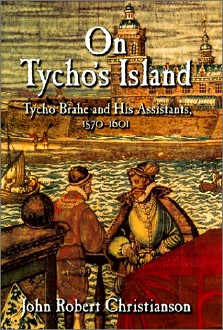|
On Tycho's
island : Tycho Brahe and his assistants, 1570-1601 / John
Robert
Christianson. - Cambridge : Cambridge university press, 2000.
-
XII-451 p. : ill. ; 24 cm.
ISBN
0-521-65081-X
|
|
NOTE
DE L'ÉDITEUR :
Tycho Brahe (1546-1601), the premier
patron-practitioner of science in sixteenth-century Europe, established
a new role of scientist as administrator, active reformer, and natural
philosopher. This book explores Brahe's wide range of activities which
encompass much more than his reputed role of astronomer.
Christianson broadens this singular perspective by
portraying Brahe as Platonic philosopher, Paracelsian chemist, Ovidian
poet, and devoted family man.
From his private island in Denmark [Ven, or
Hveen], Brahe used patronage, printing, friendship, and marriage to
incorporate men and women skilled in science, technology, and the fine
arts into his program of cosmic reform. This pioneering study includes
capsule biographies of over 100 men and women, including Johannes
Kepler, Willebrord Snel, Willem Blaeu, several bishops and numerous
technical specialists all of whom helped shape the culture of the
Scientific Revolution. Under Tycho Brahe's leadership, their teamwork
achieved breakthroughs in astronomy, scientific method, and research
organization that were essential to the birth of modern science.
|
| CONTENTS |
Preface
Part I. On Tycho's Island :
Introduction
1. In
King Frederick's service (1575-1576)
2. Junker and
peasants (1576-1581)
3. Among friends
(1570-1576)
4. Founding the
familia (1576-1584)
5. Breakthrough
(1584-1587)
6. The problem of
continuity (1580-1591)
7. The school of
Europe (1591-1593)
8. Magdalene and
calumny (1593-1597)
9. The Tempest (1597)
10. Epilogue : in
search of Maecenas (1597-1601)
11. Legacy
Part II. Tycho Brahe's
coworkers
Bibliography
Index
|
|
| EXCERPT |
When
Tycho heard that the king had arrived at Frederiksborg Castle, he
hurried to meet him. There he renewed his service to King Frederick II
of Denmark and Norway (…). As a token of his grace, the king
immediately granted Tycho Brahe an annual pension of 500 dalers, which
nearly doubled his yearly income. For his part, Tycho promised to be
loyal and true and ready to serve the king according to his ability
whenever the king had need of him and summoned him to court. These were
the terms of his contract of service.
Four
days after his royal audience at Fredericksborg Castle, Tycho Brahe was
on the island of Hven. On the evening of 22 February 1576, he observed
a conjunction of the moon and Mars near the head of Hydra. This was his
first recorded observation from Hven.
Three
months later, on 23 May 1576, King Frederick II granted to Tycho Brahe
the whole island of Hven in fee, with all its resident peasants and
servants of the crown and all royal incomes and rights, quit and free,
« for the rest of his life and as long as he lives
and
desires to
continue and pursue his mathematical
studies », subject
only to the
laws of Denmark and Tycho's remaining loyal and true to his liege lord,
the king. Since there was no royal manor on Hven, the king granted
Tycho the sum of 400 dalers in cash to construct a suitable residence.
At the age of twenty-nine, Tycho Brahe had finally become a
royal Danish vassal and crown governor of Hven. The infrastructure for
his life's work was in place.
☐ In King Frederick's service
(1575-1576), p. 24 |
|
| COMPLÉMENT
BIBLIOGRAPHIQUE |
- Victor E.
Thoren,
« The lord of Uraniborg : a biography of
Tycho
Brahe » with contributions by John R. Christianson,
Cambridge : Cambridge university press, 1990
|
|
|
| mise-à-jour : 13
mars 2018 |

|
|
|
|